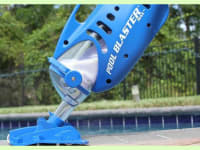Products are chosen independently by our editors. Purchases made through our links may earn us a commission.
Your swimming pool may be the most disgusting thing you own. If you haven’t learned how to clean a pool properly, then all that moisture can spawn algae, fungus, bacteria, and mosquitoes.
Many people think that pool maintenance just means adding a little chlorine every once in a while. That's a bit like thinking you don't need to clean your shower because it gets soapy daily.
Proper pool maintenance paired with tools like pool vacuums and brushes ensures your pool will provide a cleaner, more pleasant swim. We did our research on all the essentials you need to know. Here’s how to clean a pool the right way.
How often should I skim my pool?
Daily skimming is a fundamental part of good pool maintenance. Remove debris by skimming the surface with a pool net before they can settle and accumulate on the bottom. Also, remember to check your skimmer basket.
If you constantly remove bugs and leaves, you may need to trim some nearby trees, as they are often the source. Or consider investing in a pool cover, which will also help regulate temperature.
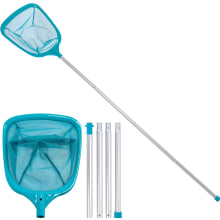
Skim away filth with this pool net.
How to prevent algae growth?
You should scrub the walls and ladders in your pool for algae around twice a week. Stainless steel pool brushes are probably your best bet if your pool is made of concrete or gunite. A nylon brush is best for fiberglass and vinyl to avoid scratches.
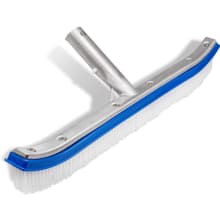
Scour away algae before it builds up with this widely compatible pool brush.
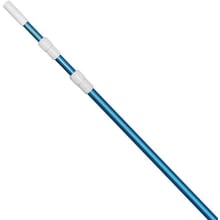
Pair your brush with a long handle for better reach.
Do I need to vacuum my pool?
Vacuuming your pool keeps the stuff you missed while skimming and brushing from destroying your pumps and filters. Pool vacuums come in manual and robotic forms.
Robotic cleaners have many tiers. Some only clean the pool floor, while other pool vacuums will climb the walls and skim the water line.
Models like the Dolphin Nautilus make digital maps, can suction up leaves and dirt, and clean a 50-foot pool in two hours. The downside is that they cost about $800.
Manual pool vacuums cost anywhere from $100 to $300 but can be cumbersome and time-consuming. We’re a company that likes robots doing chores, yet we all know someone who would prefer manual pool equipment.
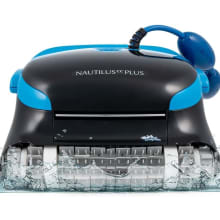
Invest in a robotic pool vacuum that will do the work for you.
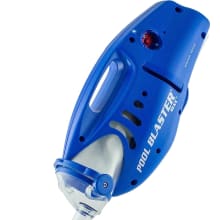
This manual pool vacuum might take more work than a robot, but it offers standout value.
How to clean a pool filter?
Regardless of whether you have a diatomaceous earth (DE), sand, or cartridge filter, you should regularly check it and remove large debris to keep water circulating. If you own a DE or sand filter, you should also consider backwashing it or reversing the water flow through the filtration system to clear it out.
The general rule is to backwash once the pressure gauge is 8 -10 psi above the normal startup pressure. The backwash procedure depends on your valve setup.
How often should I test my pool’s chlorine levels?
When you smell the scent of chlorine, it means that the water is dirty. Checking chemical levels with a testing kit is an important part of pool maintenance, and generally, you should do so as often as you use the pool.
For example, if your family uses the pool daily, you should test your water chemistry daily. It only takes one accident to make the pool filthy.
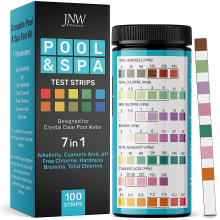
Use these strips to test water chemistry.

